Financial Reporting and Corporate Governance - Federation Uni Essay
VerifiedAdded on 2023/06/11
|8
|2116
|174
Essay
AI Summary
This essay discusses the importance of financial reporting in corporate governance, emphasizing transparency and stakeholder interests. It highlights how financial reports, prepared in compliance with financial reporting standards, provide crucial information for stakeholders' economic decisions. The essay explores the role of financial reporting in balancing stakeholder interests, resolving agency conflicts, and ensuring accountability. It also addresses the need for improved disclosures to mitigate corporate scandals and the significance of accurate, timely financial information in maintaining effective corporate governance. The essay concludes that financial reporting is essential for achieving transparency and fair representation, ultimately supporting good corporate governance practices and protecting stakeholder interests.
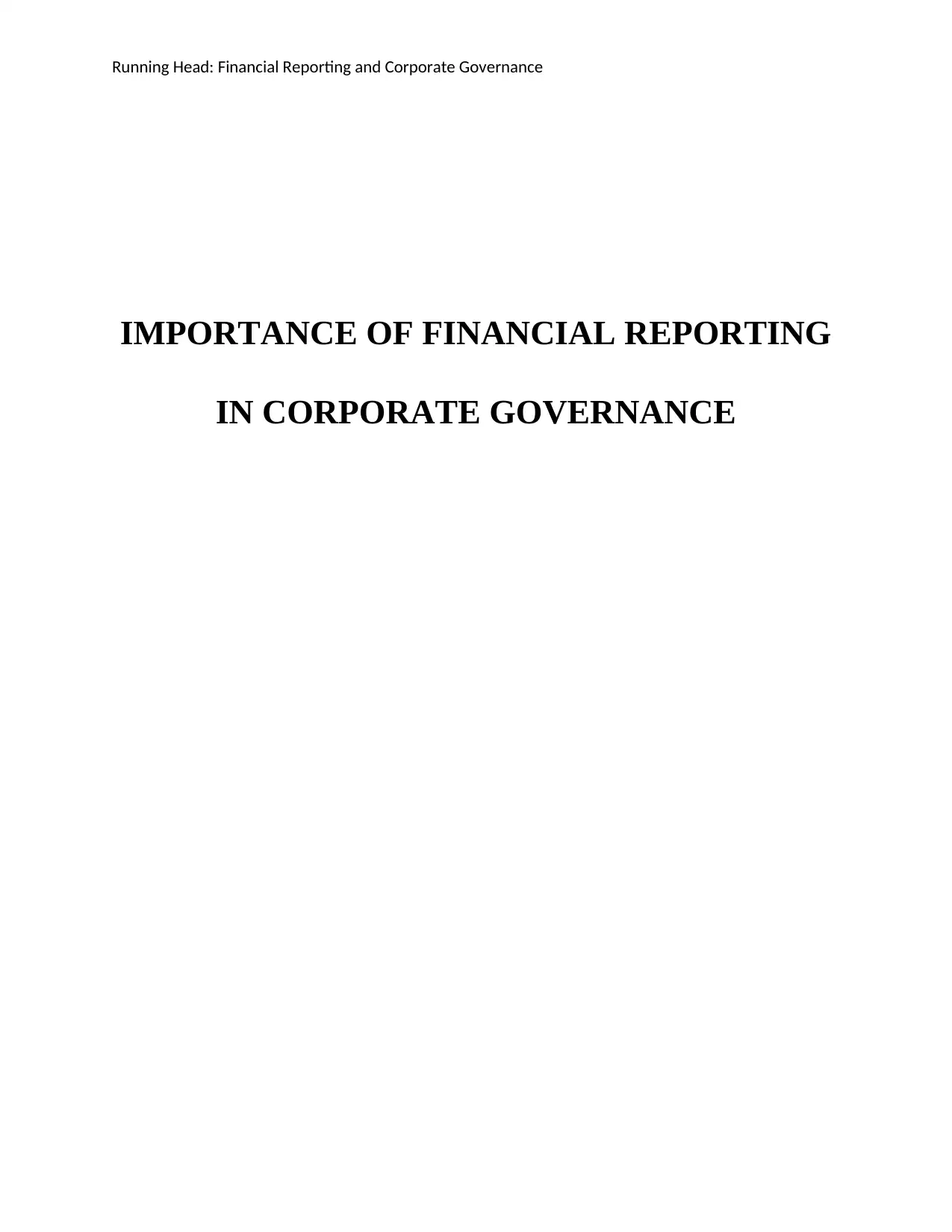
Running Head: Financial Reporting and Corporate Governance
IMPORTANCE OF FINANCIAL REPORTING
IN CORPORATE GOVERNANCE
IMPORTANCE OF FINANCIAL REPORTING
IN CORPORATE GOVERNANCE
Paraphrase This Document
Need a fresh take? Get an instant paraphrase of this document with our AI Paraphraser
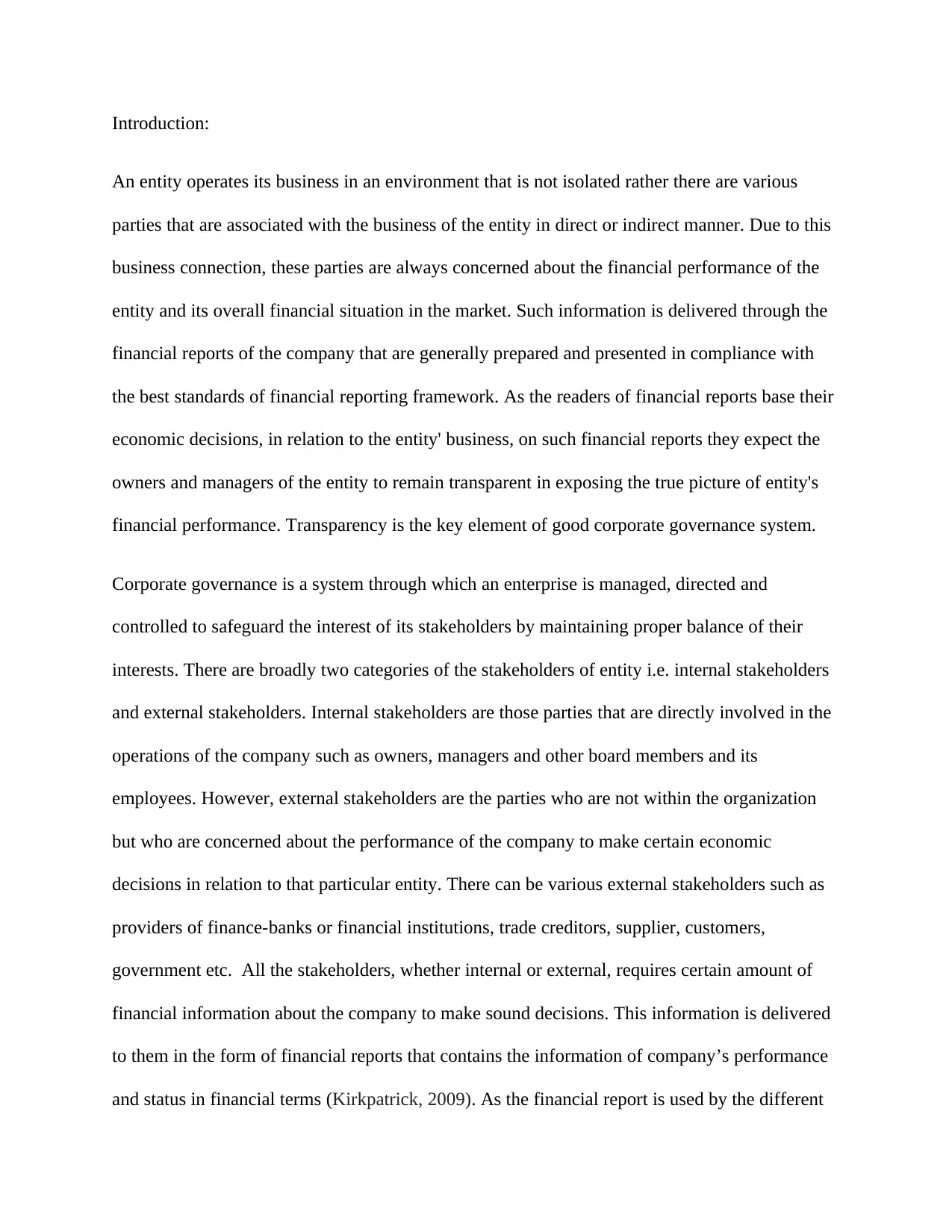
Introduction:
An entity operates its business in an environment that is not isolated rather there are various
parties that are associated with the business of the entity in direct or indirect manner. Due to this
business connection, these parties are always concerned about the financial performance of the
entity and its overall financial situation in the market. Such information is delivered through the
financial reports of the company that are generally prepared and presented in compliance with
the best standards of financial reporting framework. As the readers of financial reports base their
economic decisions, in relation to the entity' business, on such financial reports they expect the
owners and managers of the entity to remain transparent in exposing the true picture of entity's
financial performance. Transparency is the key element of good corporate governance system.
Corporate governance is a system through which an enterprise is managed, directed and
controlled to safeguard the interest of its stakeholders by maintaining proper balance of their
interests. There are broadly two categories of the stakeholders of entity i.e. internal stakeholders
and external stakeholders. Internal stakeholders are those parties that are directly involved in the
operations of the company such as owners, managers and other board members and its
employees. However, external stakeholders are the parties who are not within the organization
but who are concerned about the performance of the company to make certain economic
decisions in relation to that particular entity. There can be various external stakeholders such as
providers of finance-banks or financial institutions, trade creditors, supplier, customers,
government etc. All the stakeholders, whether internal or external, requires certain amount of
financial information about the company to make sound decisions. This information is delivered
to them in the form of financial reports that contains the information of company’s performance
and status in financial terms (Kirkpatrick, 2009). As the financial report is used by the different
An entity operates its business in an environment that is not isolated rather there are various
parties that are associated with the business of the entity in direct or indirect manner. Due to this
business connection, these parties are always concerned about the financial performance of the
entity and its overall financial situation in the market. Such information is delivered through the
financial reports of the company that are generally prepared and presented in compliance with
the best standards of financial reporting framework. As the readers of financial reports base their
economic decisions, in relation to the entity' business, on such financial reports they expect the
owners and managers of the entity to remain transparent in exposing the true picture of entity's
financial performance. Transparency is the key element of good corporate governance system.
Corporate governance is a system through which an enterprise is managed, directed and
controlled to safeguard the interest of its stakeholders by maintaining proper balance of their
interests. There are broadly two categories of the stakeholders of entity i.e. internal stakeholders
and external stakeholders. Internal stakeholders are those parties that are directly involved in the
operations of the company such as owners, managers and other board members and its
employees. However, external stakeholders are the parties who are not within the organization
but who are concerned about the performance of the company to make certain economic
decisions in relation to that particular entity. There can be various external stakeholders such as
providers of finance-banks or financial institutions, trade creditors, supplier, customers,
government etc. All the stakeholders, whether internal or external, requires certain amount of
financial information about the company to make sound decisions. This information is delivered
to them in the form of financial reports that contains the information of company’s performance
and status in financial terms (Kirkpatrick, 2009). As the financial report is used by the different
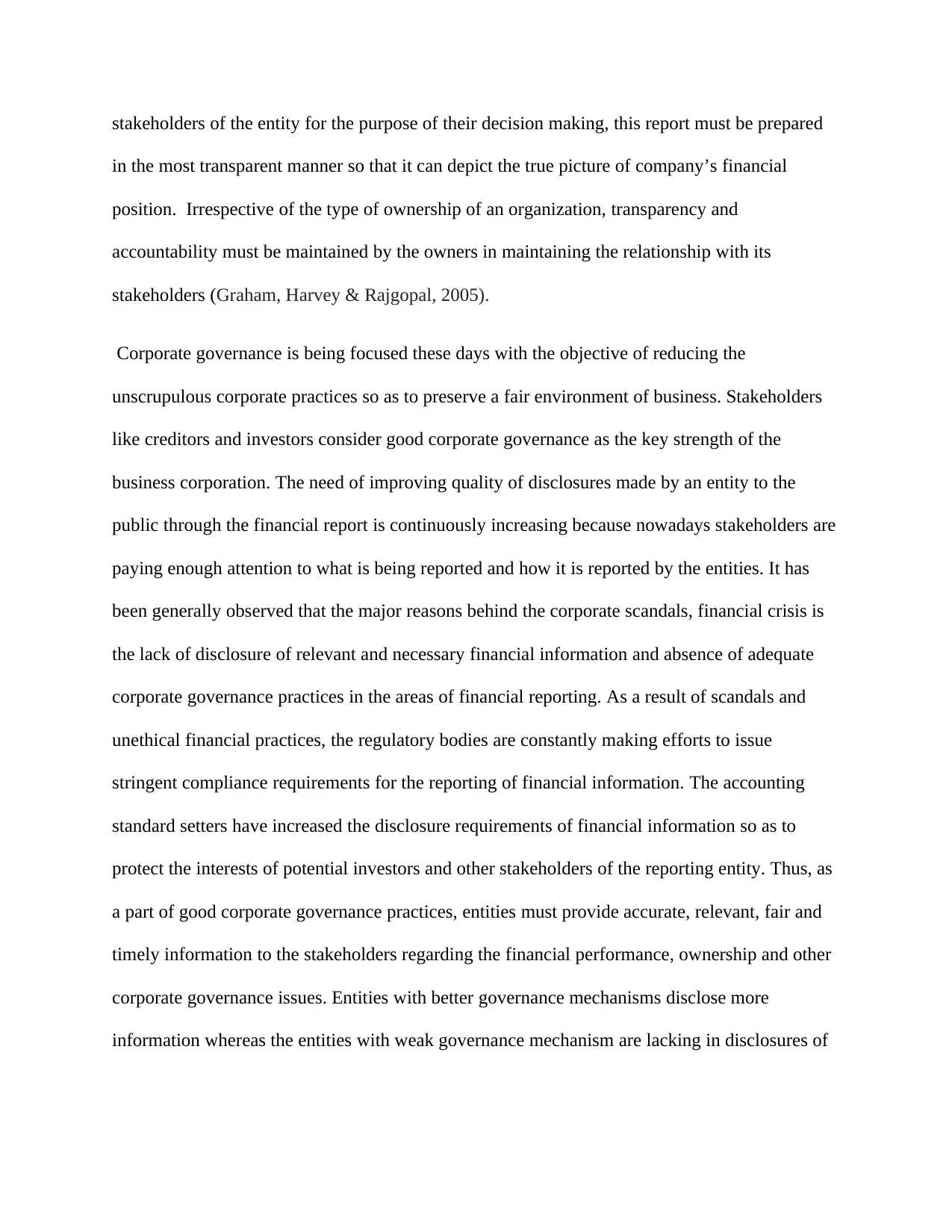
stakeholders of the entity for the purpose of their decision making, this report must be prepared
in the most transparent manner so that it can depict the true picture of company’s financial
position. Irrespective of the type of ownership of an organization, transparency and
accountability must be maintained by the owners in maintaining the relationship with its
stakeholders (Graham, Harvey & Rajgopal, 2005).
Corporate governance is being focused these days with the objective of reducing the
unscrupulous corporate practices so as to preserve a fair environment of business. Stakeholders
like creditors and investors consider good corporate governance as the key strength of the
business corporation. The need of improving quality of disclosures made by an entity to the
public through the financial report is continuously increasing because nowadays stakeholders are
paying enough attention to what is being reported and how it is reported by the entities. It has
been generally observed that the major reasons behind the corporate scandals, financial crisis is
the lack of disclosure of relevant and necessary financial information and absence of adequate
corporate governance practices in the areas of financial reporting. As a result of scandals and
unethical financial practices, the regulatory bodies are constantly making efforts to issue
stringent compliance requirements for the reporting of financial information. The accounting
standard setters have increased the disclosure requirements of financial information so as to
protect the interests of potential investors and other stakeholders of the reporting entity. Thus, as
a part of good corporate governance practices, entities must provide accurate, relevant, fair and
timely information to the stakeholders regarding the financial performance, ownership and other
corporate governance issues. Entities with better governance mechanisms disclose more
information whereas the entities with weak governance mechanism are lacking in disclosures of
in the most transparent manner so that it can depict the true picture of company’s financial
position. Irrespective of the type of ownership of an organization, transparency and
accountability must be maintained by the owners in maintaining the relationship with its
stakeholders (Graham, Harvey & Rajgopal, 2005).
Corporate governance is being focused these days with the objective of reducing the
unscrupulous corporate practices so as to preserve a fair environment of business. Stakeholders
like creditors and investors consider good corporate governance as the key strength of the
business corporation. The need of improving quality of disclosures made by an entity to the
public through the financial report is continuously increasing because nowadays stakeholders are
paying enough attention to what is being reported and how it is reported by the entities. It has
been generally observed that the major reasons behind the corporate scandals, financial crisis is
the lack of disclosure of relevant and necessary financial information and absence of adequate
corporate governance practices in the areas of financial reporting. As a result of scandals and
unethical financial practices, the regulatory bodies are constantly making efforts to issue
stringent compliance requirements for the reporting of financial information. The accounting
standard setters have increased the disclosure requirements of financial information so as to
protect the interests of potential investors and other stakeholders of the reporting entity. Thus, as
a part of good corporate governance practices, entities must provide accurate, relevant, fair and
timely information to the stakeholders regarding the financial performance, ownership and other
corporate governance issues. Entities with better governance mechanisms disclose more
information whereas the entities with weak governance mechanism are lacking in disclosures of
⊘ This is a preview!⊘
Do you want full access?
Subscribe today to unlock all pages.

Trusted by 1+ million students worldwide
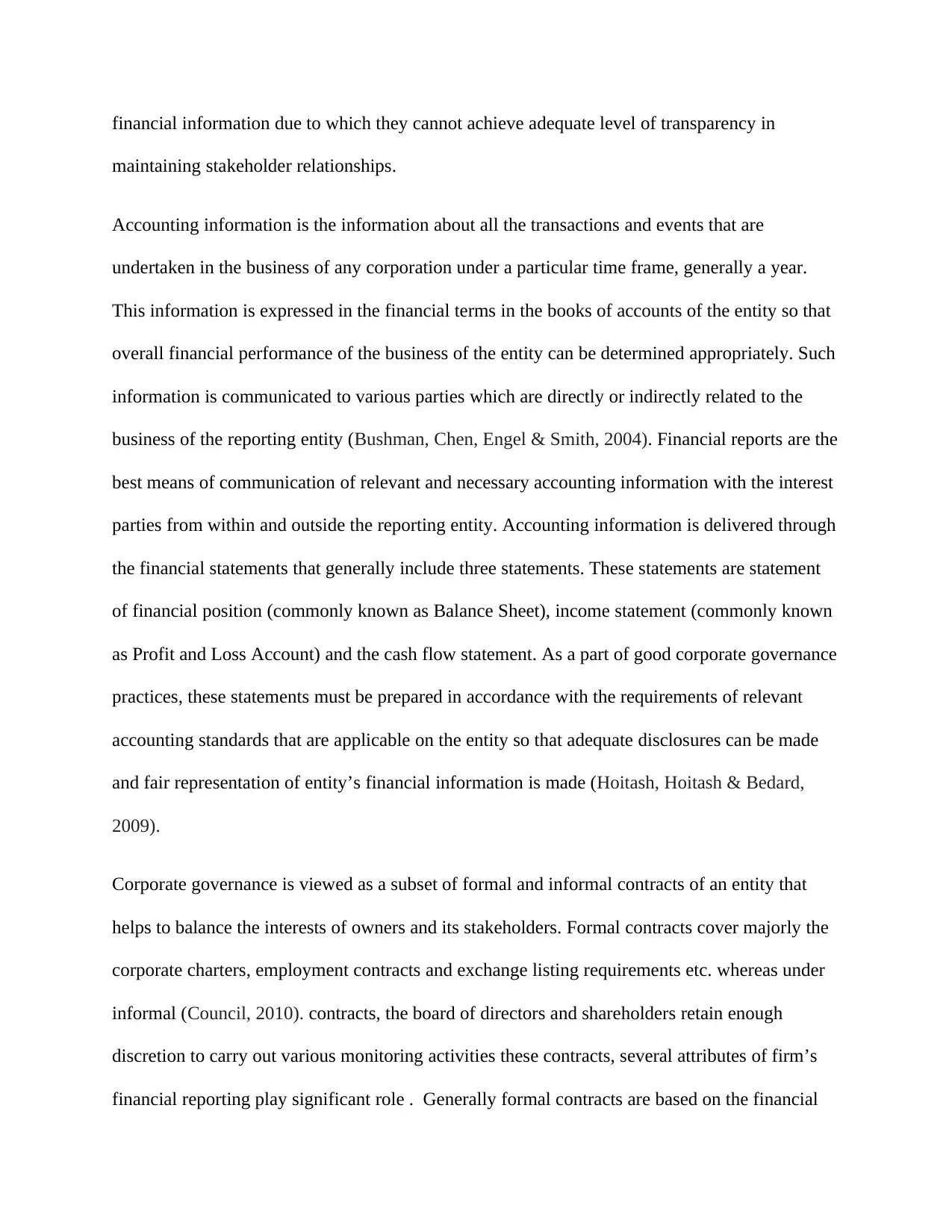
financial information due to which they cannot achieve adequate level of transparency in
maintaining stakeholder relationships.
Accounting information is the information about all the transactions and events that are
undertaken in the business of any corporation under a particular time frame, generally a year.
This information is expressed in the financial terms in the books of accounts of the entity so that
overall financial performance of the business of the entity can be determined appropriately. Such
information is communicated to various parties which are directly or indirectly related to the
business of the reporting entity (Bushman, Chen, Engel & Smith, 2004). Financial reports are the
best means of communication of relevant and necessary accounting information with the interest
parties from within and outside the reporting entity. Accounting information is delivered through
the financial statements that generally include three statements. These statements are statement
of financial position (commonly known as Balance Sheet), income statement (commonly known
as Profit and Loss Account) and the cash flow statement. As a part of good corporate governance
practices, these statements must be prepared in accordance with the requirements of relevant
accounting standards that are applicable on the entity so that adequate disclosures can be made
and fair representation of entity’s financial information is made (Hoitash, Hoitash & Bedard,
2009).
Corporate governance is viewed as a subset of formal and informal contracts of an entity that
helps to balance the interests of owners and its stakeholders. Formal contracts cover majorly the
corporate charters, employment contracts and exchange listing requirements etc. whereas under
informal (Council, 2010). contracts, the board of directors and shareholders retain enough
discretion to carry out various monitoring activities these contracts, several attributes of firm’s
financial reporting play significant role . Generally formal contracts are based on the financial
maintaining stakeholder relationships.
Accounting information is the information about all the transactions and events that are
undertaken in the business of any corporation under a particular time frame, generally a year.
This information is expressed in the financial terms in the books of accounts of the entity so that
overall financial performance of the business of the entity can be determined appropriately. Such
information is communicated to various parties which are directly or indirectly related to the
business of the reporting entity (Bushman, Chen, Engel & Smith, 2004). Financial reports are the
best means of communication of relevant and necessary accounting information with the interest
parties from within and outside the reporting entity. Accounting information is delivered through
the financial statements that generally include three statements. These statements are statement
of financial position (commonly known as Balance Sheet), income statement (commonly known
as Profit and Loss Account) and the cash flow statement. As a part of good corporate governance
practices, these statements must be prepared in accordance with the requirements of relevant
accounting standards that are applicable on the entity so that adequate disclosures can be made
and fair representation of entity’s financial information is made (Hoitash, Hoitash & Bedard,
2009).
Corporate governance is viewed as a subset of formal and informal contracts of an entity that
helps to balance the interests of owners and its stakeholders. Formal contracts cover majorly the
corporate charters, employment contracts and exchange listing requirements etc. whereas under
informal (Council, 2010). contracts, the board of directors and shareholders retain enough
discretion to carry out various monitoring activities these contracts, several attributes of firm’s
financial reporting play significant role . Generally formal contracts are based on the financial
Paraphrase This Document
Need a fresh take? Get an instant paraphrase of this document with our AI Paraphraser
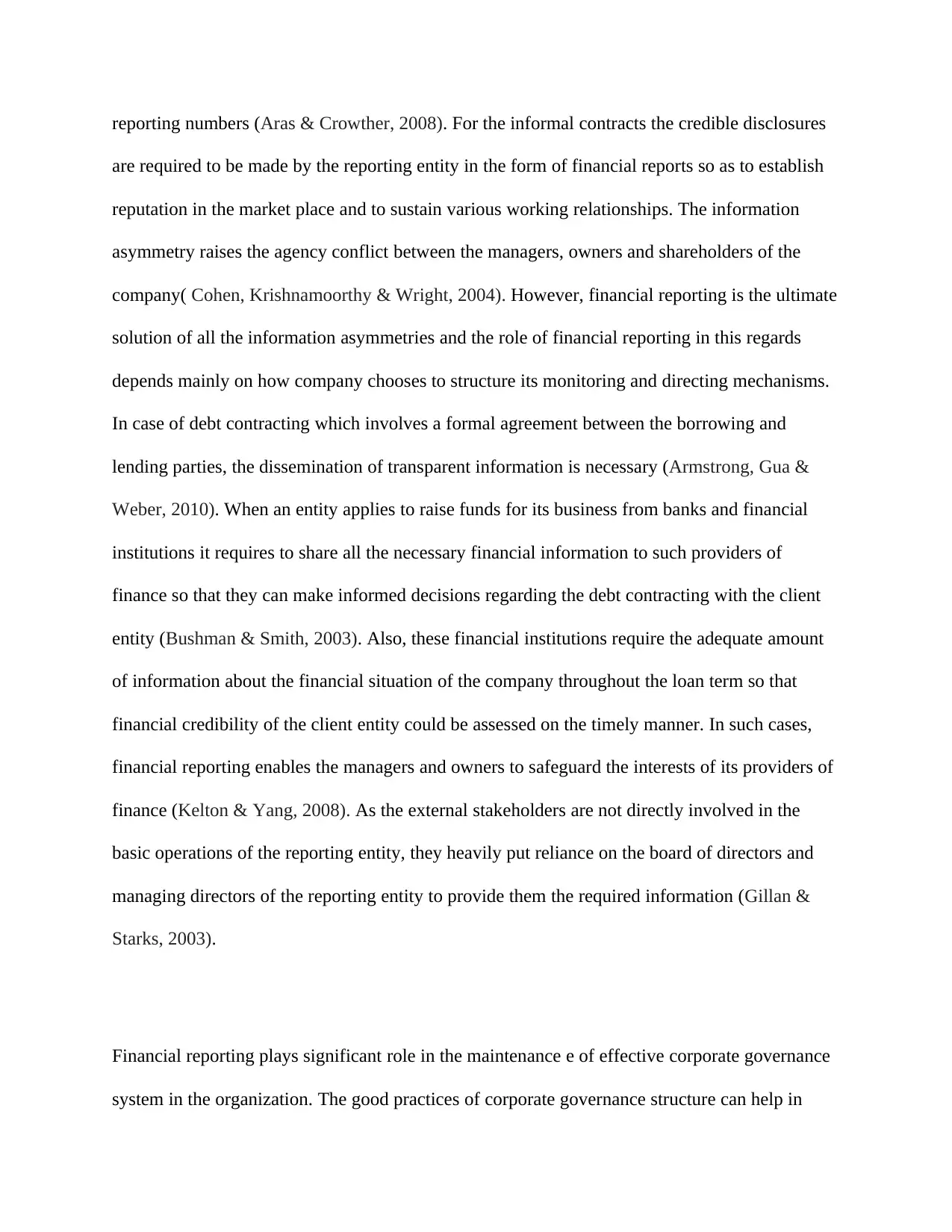
reporting numbers (Aras & Crowther, 2008). For the informal contracts the credible disclosures
are required to be made by the reporting entity in the form of financial reports so as to establish
reputation in the market place and to sustain various working relationships. The information
asymmetry raises the agency conflict between the managers, owners and shareholders of the
company( Cohen, Krishnamoorthy & Wright, 2004). However, financial reporting is the ultimate
solution of all the information asymmetries and the role of financial reporting in this regards
depends mainly on how company chooses to structure its monitoring and directing mechanisms.
In case of debt contracting which involves a formal agreement between the borrowing and
lending parties, the dissemination of transparent information is necessary (Armstrong, Gua &
Weber, 2010). When an entity applies to raise funds for its business from banks and financial
institutions it requires to share all the necessary financial information to such providers of
finance so that they can make informed decisions regarding the debt contracting with the client
entity (Bushman & Smith, 2003). Also, these financial institutions require the adequate amount
of information about the financial situation of the company throughout the loan term so that
financial credibility of the client entity could be assessed on the timely manner. In such cases,
financial reporting enables the managers and owners to safeguard the interests of its providers of
finance (Kelton & Yang, 2008). As the external stakeholders are not directly involved in the
basic operations of the reporting entity, they heavily put reliance on the board of directors and
managing directors of the reporting entity to provide them the required information (Gillan &
Starks, 2003).
Financial reporting plays significant role in the maintenance e of effective corporate governance
system in the organization. The good practices of corporate governance structure can help in
are required to be made by the reporting entity in the form of financial reports so as to establish
reputation in the market place and to sustain various working relationships. The information
asymmetry raises the agency conflict between the managers, owners and shareholders of the
company( Cohen, Krishnamoorthy & Wright, 2004). However, financial reporting is the ultimate
solution of all the information asymmetries and the role of financial reporting in this regards
depends mainly on how company chooses to structure its monitoring and directing mechanisms.
In case of debt contracting which involves a formal agreement between the borrowing and
lending parties, the dissemination of transparent information is necessary (Armstrong, Gua &
Weber, 2010). When an entity applies to raise funds for its business from banks and financial
institutions it requires to share all the necessary financial information to such providers of
finance so that they can make informed decisions regarding the debt contracting with the client
entity (Bushman & Smith, 2003). Also, these financial institutions require the adequate amount
of information about the financial situation of the company throughout the loan term so that
financial credibility of the client entity could be assessed on the timely manner. In such cases,
financial reporting enables the managers and owners to safeguard the interests of its providers of
finance (Kelton & Yang, 2008). As the external stakeholders are not directly involved in the
basic operations of the reporting entity, they heavily put reliance on the board of directors and
managing directors of the reporting entity to provide them the required information (Gillan &
Starks, 2003).
Financial reporting plays significant role in the maintenance e of effective corporate governance
system in the organization. The good practices of corporate governance structure can help in
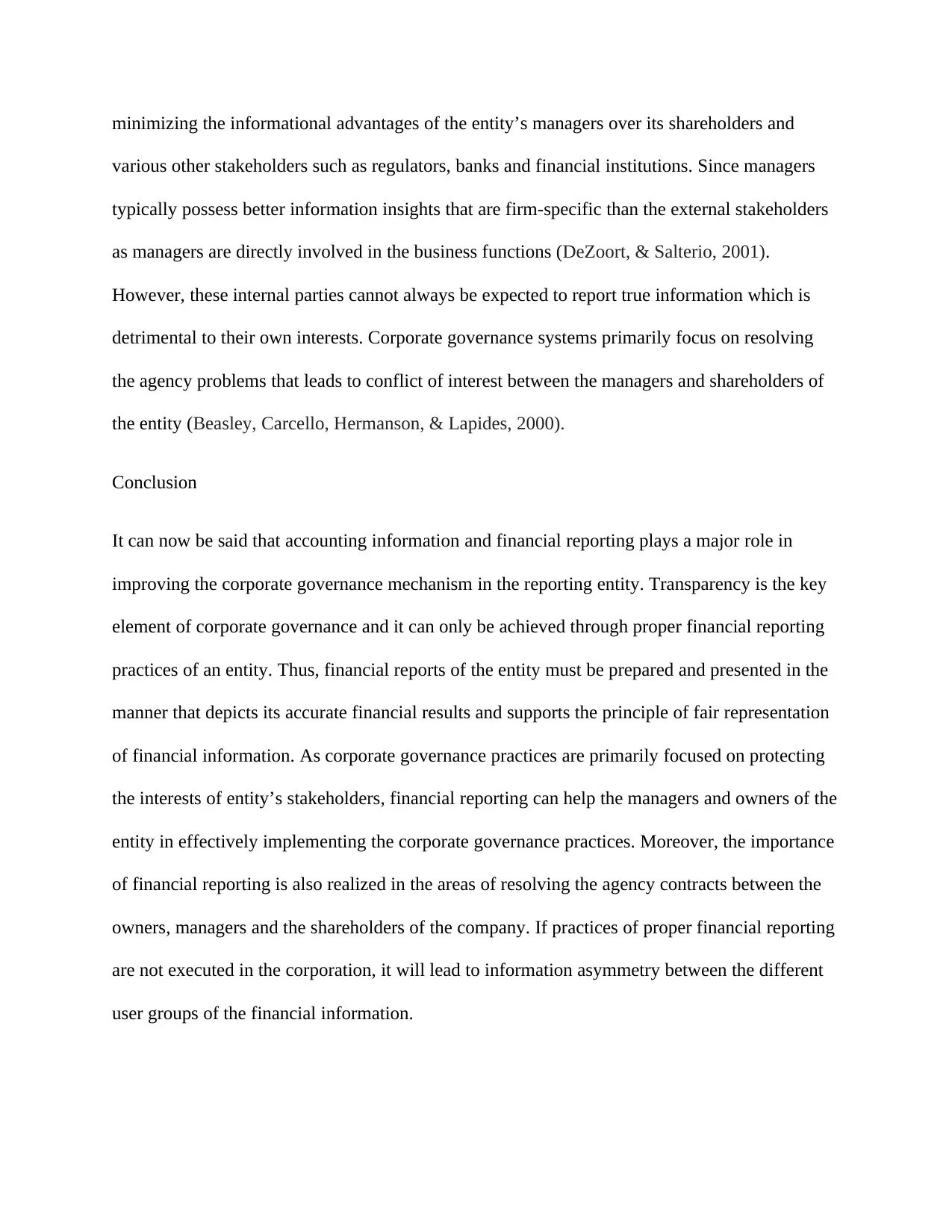
minimizing the informational advantages of the entity’s managers over its shareholders and
various other stakeholders such as regulators, banks and financial institutions. Since managers
typically possess better information insights that are firm-specific than the external stakeholders
as managers are directly involved in the business functions (DeZoort, & Salterio, 2001).
However, these internal parties cannot always be expected to report true information which is
detrimental to their own interests. Corporate governance systems primarily focus on resolving
the agency problems that leads to conflict of interest between the managers and shareholders of
the entity (Beasley, Carcello, Hermanson, & Lapides, 2000).
Conclusion
It can now be said that accounting information and financial reporting plays a major role in
improving the corporate governance mechanism in the reporting entity. Transparency is the key
element of corporate governance and it can only be achieved through proper financial reporting
practices of an entity. Thus, financial reports of the entity must be prepared and presented in the
manner that depicts its accurate financial results and supports the principle of fair representation
of financial information. As corporate governance practices are primarily focused on protecting
the interests of entity’s stakeholders, financial reporting can help the managers and owners of the
entity in effectively implementing the corporate governance practices. Moreover, the importance
of financial reporting is also realized in the areas of resolving the agency contracts between the
owners, managers and the shareholders of the company. If practices of proper financial reporting
are not executed in the corporation, it will lead to information asymmetry between the different
user groups of the financial information.
various other stakeholders such as regulators, banks and financial institutions. Since managers
typically possess better information insights that are firm-specific than the external stakeholders
as managers are directly involved in the business functions (DeZoort, & Salterio, 2001).
However, these internal parties cannot always be expected to report true information which is
detrimental to their own interests. Corporate governance systems primarily focus on resolving
the agency problems that leads to conflict of interest between the managers and shareholders of
the entity (Beasley, Carcello, Hermanson, & Lapides, 2000).
Conclusion
It can now be said that accounting information and financial reporting plays a major role in
improving the corporate governance mechanism in the reporting entity. Transparency is the key
element of corporate governance and it can only be achieved through proper financial reporting
practices of an entity. Thus, financial reports of the entity must be prepared and presented in the
manner that depicts its accurate financial results and supports the principle of fair representation
of financial information. As corporate governance practices are primarily focused on protecting
the interests of entity’s stakeholders, financial reporting can help the managers and owners of the
entity in effectively implementing the corporate governance practices. Moreover, the importance
of financial reporting is also realized in the areas of resolving the agency contracts between the
owners, managers and the shareholders of the company. If practices of proper financial reporting
are not executed in the corporation, it will lead to information asymmetry between the different
user groups of the financial information.
⊘ This is a preview!⊘
Do you want full access?
Subscribe today to unlock all pages.

Trusted by 1+ million students worldwide
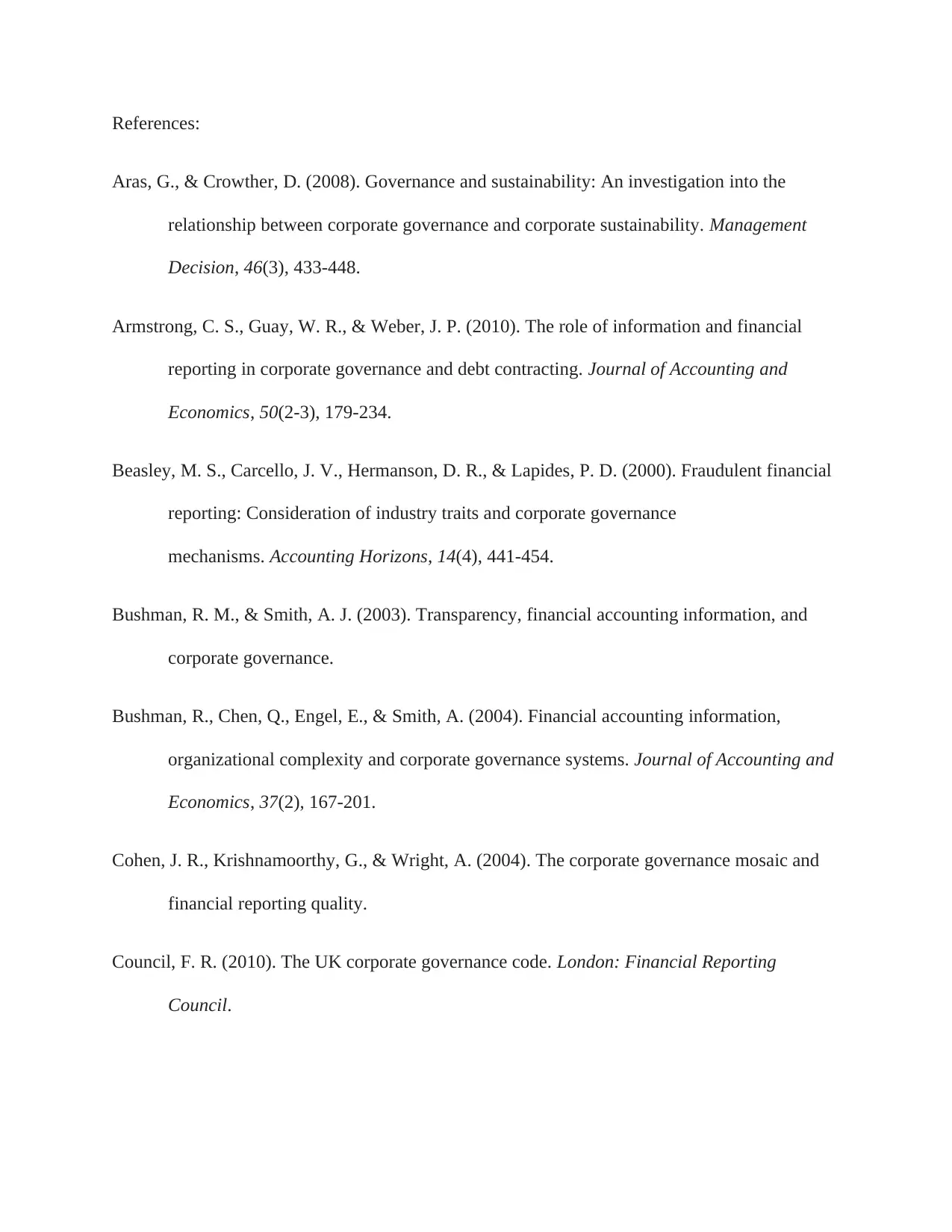
References:
Aras, G., & Crowther, D. (2008). Governance and sustainability: An investigation into the
relationship between corporate governance and corporate sustainability. Management
Decision, 46(3), 433-448.
Armstrong, C. S., Guay, W. R., & Weber, J. P. (2010). The role of information and financial
reporting in corporate governance and debt contracting. Journal of Accounting and
Economics, 50(2-3), 179-234.
Beasley, M. S., Carcello, J. V., Hermanson, D. R., & Lapides, P. D. (2000). Fraudulent financial
reporting: Consideration of industry traits and corporate governance
mechanisms. Accounting Horizons, 14(4), 441-454.
Bushman, R. M., & Smith, A. J. (2003). Transparency, financial accounting information, and
corporate governance.
Bushman, R., Chen, Q., Engel, E., & Smith, A. (2004). Financial accounting information,
organizational complexity and corporate governance systems. Journal of Accounting and
Economics, 37(2), 167-201.
Cohen, J. R., Krishnamoorthy, G., & Wright, A. (2004). The corporate governance mosaic and
financial reporting quality.
Council, F. R. (2010). The UK corporate governance code. London: Financial Reporting
Council.
Aras, G., & Crowther, D. (2008). Governance and sustainability: An investigation into the
relationship between corporate governance and corporate sustainability. Management
Decision, 46(3), 433-448.
Armstrong, C. S., Guay, W. R., & Weber, J. P. (2010). The role of information and financial
reporting in corporate governance and debt contracting. Journal of Accounting and
Economics, 50(2-3), 179-234.
Beasley, M. S., Carcello, J. V., Hermanson, D. R., & Lapides, P. D. (2000). Fraudulent financial
reporting: Consideration of industry traits and corporate governance
mechanisms. Accounting Horizons, 14(4), 441-454.
Bushman, R. M., & Smith, A. J. (2003). Transparency, financial accounting information, and
corporate governance.
Bushman, R., Chen, Q., Engel, E., & Smith, A. (2004). Financial accounting information,
organizational complexity and corporate governance systems. Journal of Accounting and
Economics, 37(2), 167-201.
Cohen, J. R., Krishnamoorthy, G., & Wright, A. (2004). The corporate governance mosaic and
financial reporting quality.
Council, F. R. (2010). The UK corporate governance code. London: Financial Reporting
Council.
Paraphrase This Document
Need a fresh take? Get an instant paraphrase of this document with our AI Paraphraser
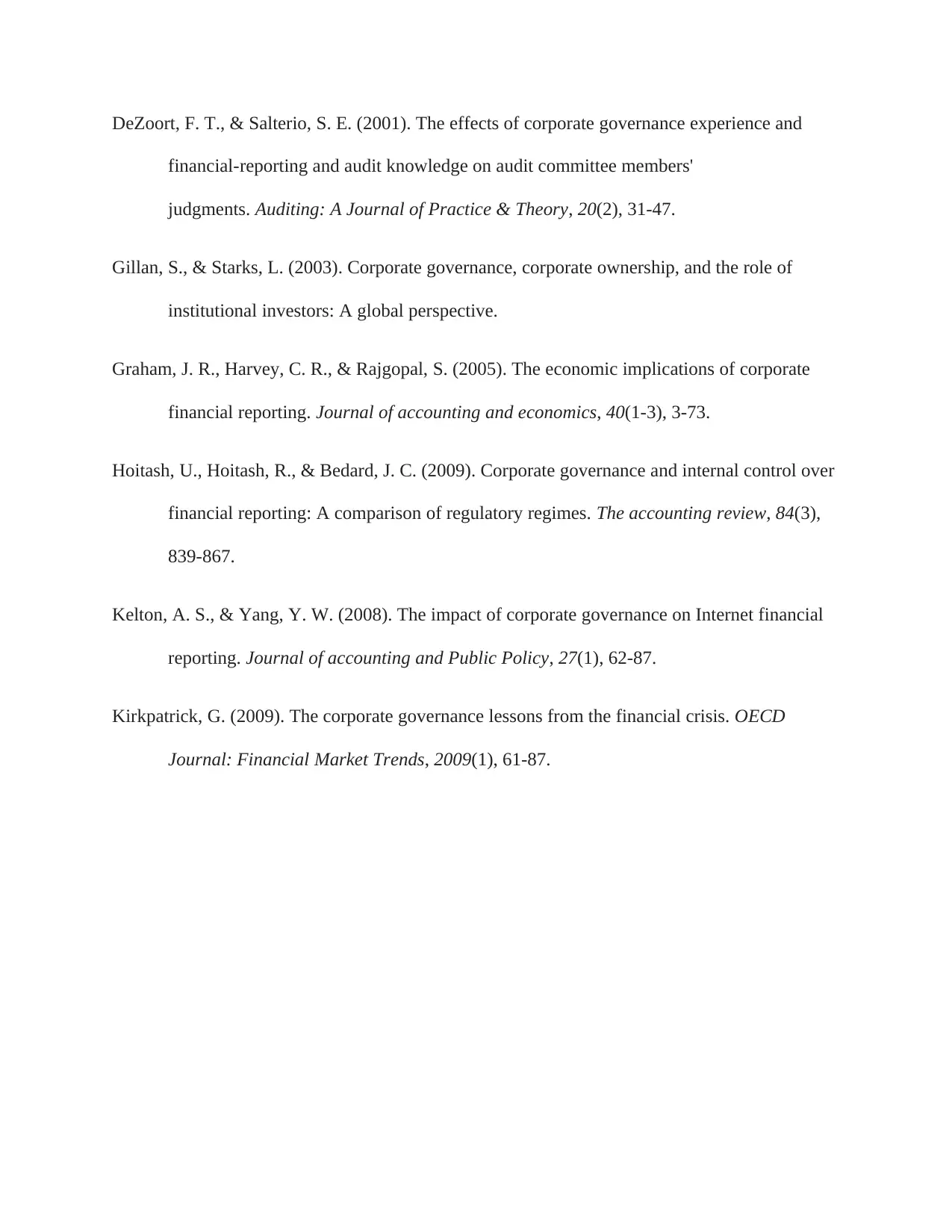
DeZoort, F. T., & Salterio, S. E. (2001). The effects of corporate governance experience and
financial-reporting and audit knowledge on audit committee members'
judgments. Auditing: A Journal of Practice & Theory, 20(2), 31-47.
Gillan, S., & Starks, L. (2003). Corporate governance, corporate ownership, and the role of
institutional investors: A global perspective.
Graham, J. R., Harvey, C. R., & Rajgopal, S. (2005). The economic implications of corporate
financial reporting. Journal of accounting and economics, 40(1-3), 3-73.
Hoitash, U., Hoitash, R., & Bedard, J. C. (2009). Corporate governance and internal control over
financial reporting: A comparison of regulatory regimes. The accounting review, 84(3),
839-867.
Kelton, A. S., & Yang, Y. W. (2008). The impact of corporate governance on Internet financial
reporting. Journal of accounting and Public Policy, 27(1), 62-87.
Kirkpatrick, G. (2009). The corporate governance lessons from the financial crisis. OECD
Journal: Financial Market Trends, 2009(1), 61-87.
financial-reporting and audit knowledge on audit committee members'
judgments. Auditing: A Journal of Practice & Theory, 20(2), 31-47.
Gillan, S., & Starks, L. (2003). Corporate governance, corporate ownership, and the role of
institutional investors: A global perspective.
Graham, J. R., Harvey, C. R., & Rajgopal, S. (2005). The economic implications of corporate
financial reporting. Journal of accounting and economics, 40(1-3), 3-73.
Hoitash, U., Hoitash, R., & Bedard, J. C. (2009). Corporate governance and internal control over
financial reporting: A comparison of regulatory regimes. The accounting review, 84(3),
839-867.
Kelton, A. S., & Yang, Y. W. (2008). The impact of corporate governance on Internet financial
reporting. Journal of accounting and Public Policy, 27(1), 62-87.
Kirkpatrick, G. (2009). The corporate governance lessons from the financial crisis. OECD
Journal: Financial Market Trends, 2009(1), 61-87.
1 out of 8
Related Documents
Your All-in-One AI-Powered Toolkit for Academic Success.
+13062052269
info@desklib.com
Available 24*7 on WhatsApp / Email
![[object Object]](/_next/static/media/star-bottom.7253800d.svg)
Unlock your academic potential
Copyright © 2020–2026 A2Z Services. All Rights Reserved. Developed and managed by ZUCOL.





